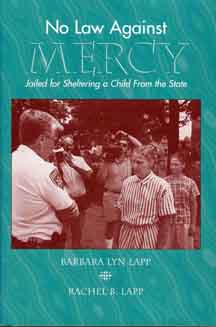Many excerpts from this book are priceless. When Rachel and Barbara refuse
to take off their clothes in exchange for donning the jail garb, they are deprived
of taking a shower or using the phone until they decide to comply and wear the
jailbird’s uniform.
Rachel tells the correction’s officer, Louise, "It’s not right that we
are being kept here."
"This is my job!" Louise said angrily. "You’re trying to deprive
me of my livelihood!"
"Louise, is money more important than integrity?" Rachel asked.
Louise moaned. She went out, and came back with four male officers. "They’re
making things hard for me," she complained to the officers.
A kindly, older officer came into our cell, to the table where I [Barbara]
was writing. "I understand what you’re standing for," he said. "I’ve
heard about your case—and I’m almost on your side. But I think this is going
a little too far." He talked for a long time urging me to cooperate. I
listened, but did not answer. As he spoke to me, Rachel stood by our bunk bed,
explaining our position to two young officers.
"We’ve been through his whole thing before!" Louise fumed. "They
have no respect for me, or anyone here! They’re trying to put my job in jeopardy!"
"We’re not here to argue the case with you," an officer told Rachel.
"We’re under orders and only doing our job."
"Do you follow all the orders you’re given even if they’re not good orders?"
Rachel asked them.
"Yes, we don’t make that judgment."
"If you are given the order to shoot me, would you follow that order?"
"No."
"You see, you have to draw the line somewhere." Rachel also told
them about Billy. "Would you refuse a child help? I really think you would
have done the same thing."
"You’re probably right," one of the officers said. (From page 83.)
Four months after their arrest Barbara Lyn Lapp, Rachel Lapp, Jacob Lapp (their
father) and Joe Torres (a supporter) are sentenced to a year in the county jail
for obstruction of justice. A rumor circulates in the jail that a county court
judge is ready to let any of them out if they would appeal the sentence. A discussion
between Carole, a corrections officer, and Barbara ensues in which Carole attempts
to entice Barbara and Rachel to do what it takes to get released from jail.
"Your daughter –you need to get home with your family," she said,
a frown drawing deep lines across her forehead. She said she thinks if the two
of us would take the lead in "doing something," Dad and Joe would
follow. "How does your mom feel about this?" Carole asked. "And
Nancy—and the poor children? Isn’t it your responsibility to end this?"
After a while I [Rachel] joined in the discussion. "People like you make
the mistake of thinking that being in jail is loss of freedom," I said.
"I’ll tell you what real loss of freedom is. It’s when you come to the
point where you are afraid to say what you believe, and live it."
This book is quite literally one of the most insightful, moving and inspirational
books I have ever read. The flyer promoting this book sums up its power in a
few short lines:
